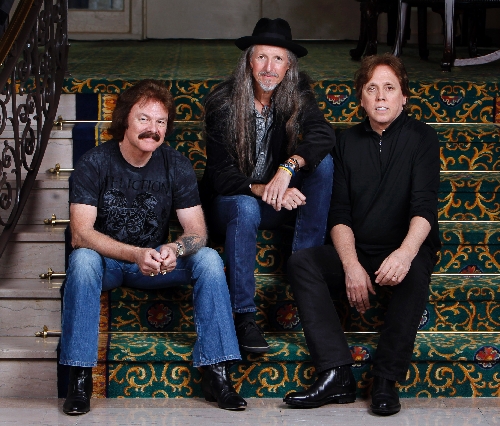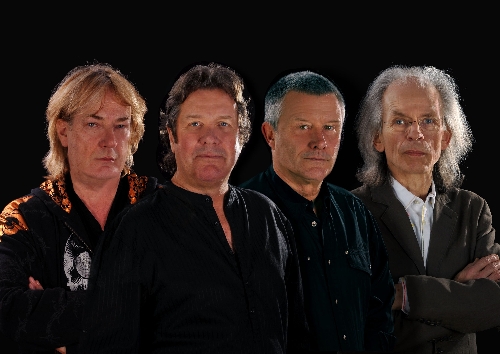Classic rockers continue forward motion despite low album sales


Safe to say, most people with tickets for Asia on Saturday will be singing "Heat of the Moment" as they drive to Green Valley Ranch, not "Face on the Bridge."
And Doobie Brothers fans headed to the Las Vegas Hotel this weekend plan to "Listen to the Music," but not necessarily "World Gone Crazy."
But it’s classic rockers with decades of longevity – 40 years for the Doobies and 30 (of noncontinuous service) for Asia – who have the most perspective on a music industry turned upside down.
It’s a world where a new album from a rock institution doesn’t get a big-budget rollout from a major label, and may not even chart. A world where the live shows pay the bills now, and fans can be impatient with anything less than a safe return on nostalgia-dollar investment.
A world where you only feel a little bit embarrassed asking the Doobie Brothers or Asia if it was worth the effort to record a new album.
"I think it shows a willingness on behalf of the band and also makes it more popular with the fans," Asia’s Geoff Downes says of the "supergroup" of progressive rock alumni that debuted in 1982. "They know the band’s not just living off its former glories, but actually trying to achieve and break new ground on stuff."
"We do this music because we like to play," agrees Patrick Simmons of the Doobie Brothers. "We have to do things for ourselves, that’s just the bottom line. Whether people like it or not it doesn’t really matter, because we’re gonna do it anyway.
"It’s one of the things you can be self-indulgent about when you’re on the road and riding buses every night and putting up with a lot of bad food and stuff," Simmons says. "That’s the perk for us, that we get to go up there and play a few songs that are out of the norm."
NO LONGER A NUMBERS GAME
Asia’s new album "XXX" (which, despite some hair-raising search-engine results, refers to the band’s 30-year existence) is actually the third since the original lineup reformed in 2006.
There’s an efficiency that was lacking in what Downes calls the band’s "rudderless" heyday, even if sales don’t come close. While the debut album (now reissued in a deluxe box set) topped Billboard’s album chart for nine consecutive weeks in 1982, "XXX" spent just one week in July at No. 134.
That’s better than "Omega," which didn’t make U.S. charts at all in 2010 (as with many a British band, European sales are stronger) but not as good as "Phoenix," which spent a week at No. 73 in May 2008.
"We were happy to be part of that era but the times have changed and you’ve got to accept that’s the way it is now," says keyboardist Downes, who shares the stage with singer-bassist John Wetton and prog-rock maestros Steve Howe on guitar and Carl Palmer on drums.
"We work within a fairly tight budget," Downes says of recording for the Italian independent Frontiers. "I don’t think the days of the excesses of staying in a studio for months on end is an option. I think you’ve got to be fairly sensible these days."
And, he adds. "I think that’s not necessarily a bad thing. We’re a bit more concise, a bit more businesslike about it. … You can sit around for days in a studio and not come up with anything." Asia is now "a little more precise about how we set it up. We make sure we’ve got the material in some kind of reasonable shape before we go into the studio. Little things like that, they all kind of add up and make it a more of a smooth-running machine than maybe the randomness of how it was in the early days."
The Doobie Brothers’ 2010 "World Gone Crazy" debuted at No. 39 on Billboard’s album chart. The album was an all-in effort with guest vocals from Willie Nelson and Michael McDonald – who fronted the group in its top-selling blue-eyed soul era – and a reunion with producer Ted Templeman, who helmed many of the band’s best-selling albums.
"For us it really was a good thing," Simmons says. The independent label HOR Entertainment "didn’t have huge clout, but they were pretty supportive and had enough resources to get us out of the chute, so to speak."
And if the industry has shifted from an album model to downloads of a la carte songs, there is no reason why classic groups can’t share in that too. "We end up selling 100,000 albums maybe, but then we sell a lot of downloads of songs," Simmons says.
The album may not have charted, but the song "Far From Home" at least hit No. 24 on Billboard’s Adult Contemporary chart in June of last year. New material likewise reminds listeners on streaming services such as Pandora and Spotify that a band is still active. "Every time you do a record, it increases your fan base," Simmons says.
ROLL WITH IT
Veteran bands may have given up big sales, but they can share the same freedom as a new artist who goes straight to iTunes with self-released music.
"We do have a lot more flexibility because we don’t have a label breathing down our necks saying they don’t like this and they don’t like that," Downes says.
"In many ways that puts you in a better place than maybe we were in the early days, where there was a lot of pressure for us to come up with – not a certain type of music – but certainly a certain amount of success. The band really felt that pressure. It was there pretty much from Day One."
Steve Winwood, who plays the Palms today, agrees the record industry doesn’t have the power it once had, which in many ways is a good thing for music.
"It’s not particularly a good thing for the music industry, but for music it’s quite good," he adds. In the 1980s, record companies "very much tried to control what the music was sounding like."
But label pressure may have been replaced by fan restlessness. Neil Diamond joked about it at the MGM Grand Garden in 2009, introducing songs from a tasteful, personal new album produced by Rick Rubin : "You can sit back and relax and enjoy, or you can take a potty break."
"It is a tricky thing," Winwood says. "There is no doubt there are a fair amount of people who want to come out and see me who are probably my age, who grew up with the music I was making in the ’60s and ’70s and they now want to experience the music that made them happy in the ’60s and ’70s – played by the person that played it in the ’60s and ’70s."
But the Doobie Brothers’ Simmons says to ticket-buyers, "It’s not up to you, you’re not the one up here performing. If you don’t like it, don’t come," he says with only a trace of a laugh.
"I don’t say that dismissively, though I am dismissing people who only want to live in the past and don’t want to be open to new things.
"If you like an artist, they deserve the respect to allow them to be creative and show their creativity. Otherwise, you just like your own experience and that’s all you’re there for."
Contact reporter Mike Weatherford at mweatherford@ reviewjournal.com or 702-383-0288.
PreviewAsia
7 p.m. Saturday
Ovation at Green Valley Ranch Resort
$31.50-$51 (800-745-3000)
The Doobie Brothers
8:30 p.m. today-Saturday
Theater at LVH
$81.85-$104.95 (732-5755)












